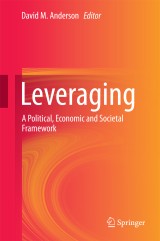Details

Leveraging
A Political, Economic and Societal Framework|
96,29 € |
|
| Verlag: | Springer |
| Format: | |
| Veröffentl.: | 04.06.2014 |
| ISBN/EAN: | 9783319060941 |
| Sprache: | englisch |
Dieses eBook enthält ein Wasserzeichen.
Beschreibungen
This book considers the current domestic and global political and economic landscape and will show that there are three different but related kinds of leverage that together have emerged as the dominant strategy in economics, politics and international relations. The economic crisis of 2008-09 was called by most economists a crisis of “over-leverage.” Yet no one has argued that there has also been a leverage crisis or at least a “leverage challenge,” in other aspects of life. The This book argues that there is a “leverage mean” in between the extremes of too little leverage and too much leverage that provides the basis for resolving the various crises and challenges. This book, which grows out of a Brookings Institution paper “The Age of Leverage,” will analyze bargaining leverage, resource leverage and economic investment leverage and should draw the attention of students and teachers in political and economic philosophy.
Part One: A Leverage Framework.- Introduction.- Part Two: Leverage and the Economy.- The Evolution of Real Estate Leverage.- The "Overleveraged" Crisis of 2008 from the Standpoint of Keynes's Monetary Theory of Capitalism.- China Leveraged the West to Grow Its Economy and Its Comprehensive National Power.- Part Three: Leverage and Politics: Domestic, State, and International.- The Morality of Leverage and the Leverage of Morality.- Leveraging Public Judgment.- Leverage in a Labor Management Relationship: Maximizing the Use of Leverage by Finding a Constructive Leverage Mean.- Leverage and the Regulatory Process.- The Advantages and Pitfalls of Leveraging Hunitarian Development and Diplomacy Towards National Security.- Part Four: Leverage and Social Relations.- Leveraging in Modern and Contemporary Families.- From the Leverage Ethic and Leverage Mean to a National Paid Parental Leave Policy.- Part Five: Next Steps.- Next Steps.
<p>David M. Anderson is Senior Vice President, State Relations, at The Washington Center for Internships and Academic Seminars. He has taught at The George Washington University, the University of Cincinnati, and Johns Hopkins University. </p>
<p>Leveraging, according to David M. Anderson and his colleagues, is both a basic principle of human conduct and the most dominant strategy in recent years that individuals, organizations and countries use to pursue their ends. Although many scholars agree that a crisis of “over-leveraging” caused the financial crisis of 2008-2010, it has not been appreciated that an “over-leveraging” crisis has existed in American politics and the American family system as well. This book addresses the need for a “Leverage Mean” (falling between the extremes of too much leverage and too little leverage) in the economy, politics, family life, and international relations. It identifies three different kinds of leveraging—bargaining, resource, and investment and provides an explanatory and normative theory which draws on the fields of economics, political science, sociology, history, psychology, international relations, law, and philosophy. Moreover, it shows how the dissolution of the Cold War, the dismantling of the modern family, and the rise of the Internet along with the deregulation of the financial services industry led to the diffusion of power which has made leveraging of the first importance for everyone. This book should be of interest to social scientists, philosophers, political theorists, public policy makers and politicians.<p></p><p><i>David Anderson and his colleagues are the first to characterize and assess one of the major </i><i>instruments of power of the contemporary era. This volume represents the best work on </i><i>leverage since Archimedes and will be widely read and discussed.</i></p><p>Benjamin Ginsberg, David Bernstein Professor of Political Science and Chair, Center for Advanced Governmental Studies, Johns Hopkins University</p><p> <i>Leverage might literally be the operative word of the 21st century. Anderson‘s volume </i><i>is a wide-ranging and illuminating study of this fundamental and dynamic concept.</i></p><p>Parag Khanna, Senior Fellow, New Amer</p>ica Foundation, author of <i>The Second World: How Emerging Powers Are Redefining Global Competition in the Twenty-first Century</i> <p></p>
Examines the role of bargaining leverage, resource leverage and investment leverage across societal sectors Investigates the role of leverage in the economic crisis of 2008-09 and in the broader context of the theory of capitalism Discusses the risk and theory behind over-leveraging in both economic and political contexts Includes supplementary material: sn.pub/extras


















